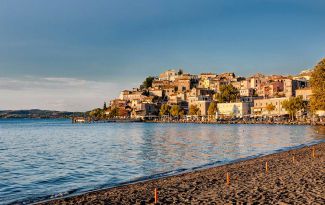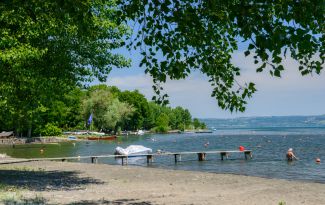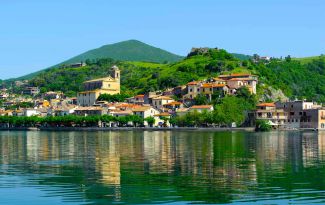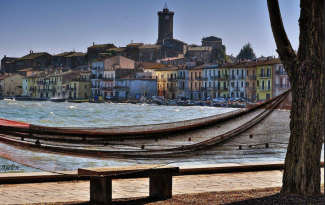The attraction of a volcanic lake
Lake of BraccianoThe natural beauty, the historical and cultural heritage, the archaeological and artistic heritage: the ingredients that make Lake Bracciano a very popular tourist destination. Three settlements rise on its banks: Bracciano, Trevignano Romano and Anguillara Sabazia.
The village of Bracciano has been build around the magnificent castle which dominates the town. For its structural and architectural features and the excellent state of preservation, is one of the most important castles of Italy. To visit also the charming village of Trevor Romano, dominated by the ruins of the fortress of the Orsini, situated in a place already inhabited by the Etruscan).
The necropolis located in Sabatia Olivetello; graves have been found in its particular beauty kits, which are discussed, along with other interesting ornaments, in the 'Antiquarian' in the Town Hall hosted by Trevor. Do not miss the gastronomic specialties of the area where the fish is, of course, the main protagonist. Eels and fillets of perch, whitefish, broccoli, mushrooms, game and white wine are the most appetizing dishes, prepared and served in many restaurants around the lake.
Lake of Bolsena
The Lake Bolsena (Latin: Lacus Volsiniensis / Volsinii Lacus) is a lake in central Italy formed over 300 000 years ago following the collapse of the caldera volcanoes belonging to the chain of Volsini. It is the largest volcanic lake in Europe.
There are numerous tourist facility ideal to stay in contact with nature, mainly in the Agriturismo, cottages and "bed and breakfast".
Lake Bolsena nowadays is still largely untouched and is one of the few great Italian lakes to be completely bathing. The cleanliness of its waters (saying of fishermen that this is "the lake with a drink!") guaranteed an extraordinary development of plant and animal, including many species of algae and underwater plants completely disappeared in other basins.
Accommodations in this area:

Poggio di Montedoro - Bolsena

Il Tesoro - Acquapendente








